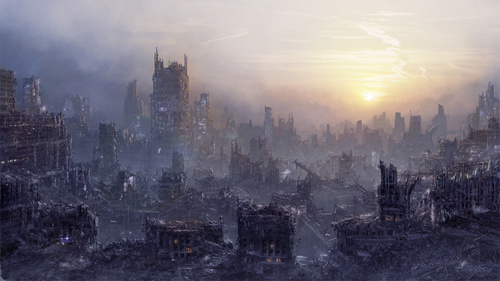The damage is done
Sat. January 13, 2007Categories: Abstract Dynamics

‘We should acknowledge that our world is doomed, that it has no future;’ Dominic writes in a fascinating post, ‘but also that it is not the only possible world, that other worlds have been and will be.’
But if it is easier to imagine the end of the world than the end of capitalism, then it is precisely the thinkability of different worlds succeeding this one that is at issue. In terms of the current political imaginary, there is only this world, then nothing… Or there are n number of new worlds, but each is a different rendering of capitalism: none would be an alternative to capitalism. Capitalism would be the equivalent of Alvin Plantinga’s transworld depravity: that which must occur in any possible world. China or Dubai already give us glimpses of other possible capitalist worlds, establishing, incidentally, that while there is no parliamentary democracy without capitalism, it is perfectly possible for there to be a capitalism without democracy.
In many ways, however, we have ceased to imagine the end of the world just as surely as we have lost our ability to imagine the end of capitalism. Oddly, apocalyptic dread – so omnipresent during the Cold War – seems to have been extirpated from the popular unconscious. The possibility of environmental catastrophe may well be entertained as a rational hypothesis, but it does not dominate our collective dreams in the way that the threat of nuclear annihilation once did.
Perhaps it is necessary to change the terms of the formula. If it is increasingly difficult to imagine alternatives to capitalism, that is because the world has already ended. In this condition of mors ontologica, the world goes on, but nothing new can ever happen; what remains is a mechanical permutation through options that have already been fixed.
Philip K Dick was of course the great poet of the intuition that the world had already ended in this sense. Ubik and A Scannder Darkly are seen through the eyes of the (existentially or physically) dead. The deteriorating world of Ubik is indeed a ‘glimpse [into] the breakdown and dissolution back into nothingness’, that Jodi put described in the original post which in part prompted Dominic’s reflections. In A Scanner Darkly, death is defined in terms of an inability to act, a terrible stasis: “That’s what it means to die, to not be able to stop looking at whatever’s in front of you. … You can only accept what’s put there as it is.”
What Dominic points to is a situation that is that is even more dire, where it is perfectly possible to act, but any action is now irrelevant. The time to act was in the past; the damage is done; all we can do is await consequences which can no longer be averted:
- at least one plausible model of climate change asserts that all the emissions needed to change the climate irrevocably have already been emitted, and the effects of this change are even now ineluctibly unfolding: we pass from tipping-point to tipping-point. HIV/AIDS has already killed millions across the world, making orphans of millions more. None of this can be undone, and there is no possible future world unmarked by these catastrophes. The future designated by the unless, the future hoped for by the Western environmentalists and NGO workers of the 80s and 90s, cannot now come to pass. It has already ended, and we are persisting in its degrading memory – how many of the narcissistic disorders of our culture can be attributed to this awareness?
Here, then, is one sense in which we are ghosts, impotently tilting at a world we can no longer affect.
It’s worth pausing here to reflect that, in the debates over climate change, it is no longer the apocalyptic potential of current trends that is disputed; what is doubted is whether any effective action could be taken to deal with it. Questioned about whether they will give up flying in order to combat climate change, people will often respond that there is no point, because others will continue to fly: thus runs the fatalism of capitalist realism. If Dominic is correct, of course, then they are not fatalistic enough.
Jodi’s intution that the ‘world has already ended, and we are persisting in its degrading memory’ serves as an apt epigraph for postmodernism (=late capitalism). The ‘China brands’ problem – ‘who can name a Chinese brand?’ – may well be another symptom of this secret apocalypse. Even China’s massive transformation is not enough to change the basic palette of capitalism. All that remains is cloning and recombination.